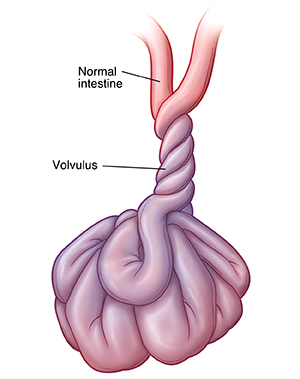When Your Child Has a Volvulus
A volvulus occurs when the bowel (intestine) twists around itself and creates a blockage (obstruction). It can also cut off blood flow to part of the intestine. Without blood flow, that part of the intestine can die. A volvulus can cause serious digestive problems. It can even be fatal. Most often, a volvulus occurs in children younger than 1 year of age.

What causes a volvulus?
A volvulus often occurs in children with intestinal malrotation. This is a problem in which the intestine twists and turns the wrong way inside the belly (abdomen). A volvulus can also be caused by infection or blockage in the intestine. In some cases, a volvulus occurs for unknown reasons.
What are the symptoms?
Symptoms of a volvulus are often sudden and severe. They can include:
How is a volvulus treated?
A volvulus must be treated right away. It usually requires emergency surgery. During surgery:
-
The surgeon makes a cut (incision) in the belly.
-
The intestine is carefully untwisted.
-
If a part of the intestine has died from lack of blood flow, it is removed. The surgeon then reconnects the healthy ends of the intestine.
-
If a long length of intestine is removed, the surgeon may have to create a small opening (stoma) in your child’s belly. This gives a new way for waste to leave the body. If your child needs a stoma, the doctor will tell you more.
In some cases, a procedure called a colonoscopy or sigmoidoscopy can correct the problem. This involves the use of a flexible tube (scope) with a light on the end. The scope is passed into the colon (large bowel) through the rectum and sometimes can be used to untwist the intestine. But the child still may need surgery to prevent the problem from coming back.
What are the long-term concerns?
With treatment, your child will likely do well. But you should watch for signs of a volvulus in the future. If a long portion of intestine must be removed, your child may have lifelong digestive problems, such as short bowel syndrome. Your child may also be at risk for a blockage of the small bowel in the future. Talk with your child’s doctor about what to expect.